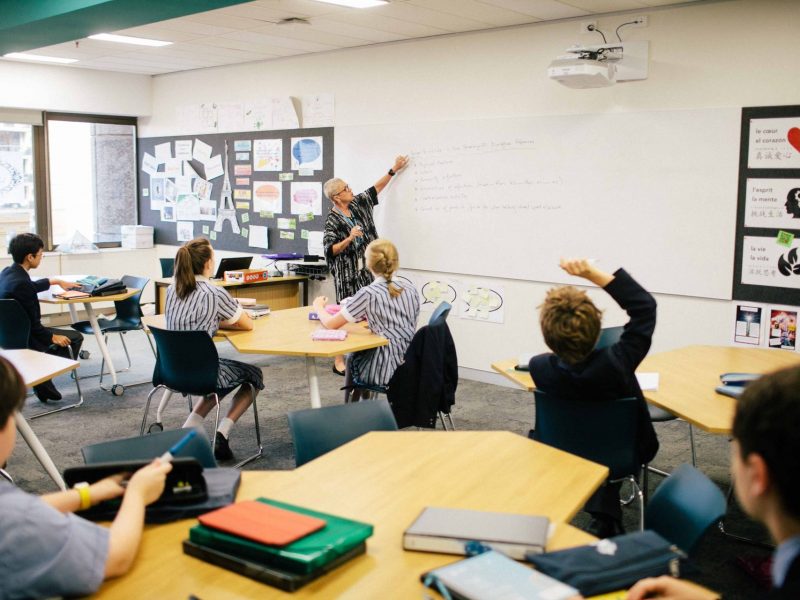We teach the NSW curriculum through the MYP framework.
We are interested in how students learn – using communication, research, self-management, collaboration and critical thinking skills.

All students commencing Year 7 undertake the Middle Years Programme (MYP) of the International Baccalaureate under the curriculum of NESA, an internationally recognised framework for learning. The IB MYP is specifically designed for Middle School students and caters to their particular learning needs and styles during this stage of life.
The MYP puts an emphasis on learning by doing and experiencing. For instance, a science lesson on materials might see the students making shoes in order to make real-world connections with key concepts. It is inclusive in nature, providing academic rigour for all students, including gifted and talented and those needing support.
As the culmination of the student’s final year of the MYP, they undertake an independent ‘Personal Project’, which is a significant piece of work of the student’s own initiative and creativity. The project requires research and the creation of a product with supporting documentation.
Examples of this have been the creation of a garden, a website detailing ways to save power or the writing of a novel. This incredibly rewarding project gives students an opportunity to research an area of passion.
The MYP ensures that the middle years of schooling are not lost. Rather it builds skills so that our students are prepared for the move to the senior years, regardless of whether they chose to study the HSC or the IB Diploma. For instance, the independent ‘Personal Project’ readies a student for the challenges of a major work.
The advantages of the MYP
We want to encourage our students to become more skillful in their thinking. The MYP calls this ‘Approaches to learning’ (ATL). These are skills designed to enable students ‘learn how to learn.’
For instance, in the classroom, this means the teacher makes thinking more explicit or more transparent to the learner, as an example, by outlining a plan for more skilful thinking through a set of questions. This means we have a common language for teachers and students to use when reflecting and building on the process of learning.
In a world that is increasingly connected, we teach our students to be outward-looking, hopeful and respectful citizens, connected to the international community with a sense of responsibility towards its members.
The aim of the MYP is to develop students who are internationally minded: responsible members of local, national and global communities.
We make meaningful interdisciplinary connections rather than teaching subjects in isolation. This helps students to see the connections between subjects and the real world. After all, most real-world issues require insights gained from a variety of disciplines.
The MYP looks at the development of the whole person with service central to its philosophy which compliments our Christian ethos. The development of character (IB Learner Profile/St Andrew’s Cathedral School Character Strengths) is vital to this is embedded in every part of our academic and pastoral programmes. For more on character, see Wellbeing and Character
As part of the MYP framework, all students are required to take part in service activities both within the classroom and beyond. This may take the form of awareness-raising of international problems in Geography or supporting local charities and initiatives. For more on service, see Service Learning.
In the final year of the MYP, students undertake an independent ‘Personal Project’ which is a significant piece of work of the student’s own initiative and creativity. The project requires research and the creation of a product with supporting documentation. Examples of this have been the creation of a garden, a website regarding ways to save power or the writing of a novel. This rewarding project gives students an opportunity to research an area of passion.
MYP assessment and reporting
MYP assessment is a criterion-based assessment. Each subject has four criteria, each marked out of eight.
At the end of each semester, students will receive a report for each subject with the four MYP criteria and NESA outcomes.
School reports are issued at the end of Terms 2 and 4. They provide a comprehensive summary of student progress for Semester 1 and Semester 2 respectively.
Parent/teacher interviews occur annually for Middle School students, usually in Term 3.
A Weekly Parent Digest is emailed to students and their parents every Friday afternoon. This gives a brief summary of student progress, awards and events.
We believe research and evidence-based practice is at the basis of excellent teaching and learning. The School uses data dashboards to analyse student results. Teachers, Specialised Learning and Gifted and Talented use the data dashboards to recognise students in need of extra support or extension.
You may be interested in
